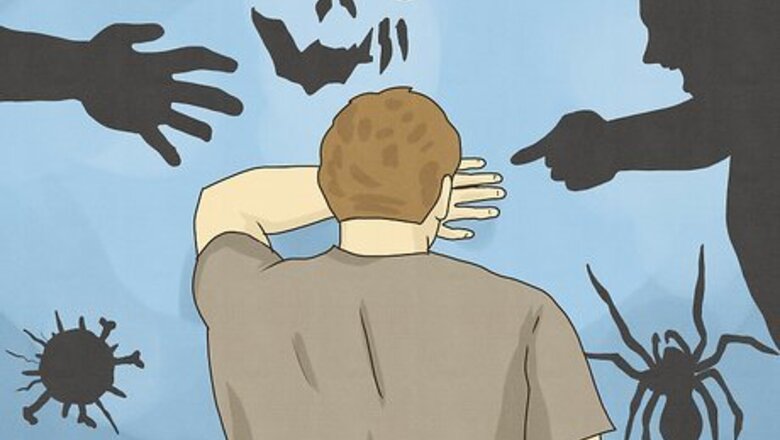
views
Dig deep to examine your fears.

Fear is often the symptom of a deeper underlying belief or issue. Identifying the source of your discomfort makes it a lot easier to tackle the feeling in the moment. Rational fears and irrational fears are dealt with in different ways, and how you go about relieving your fear depends on where it’s coming from. When you feel afraid, ask yourself, “Where is this feeling coming from?” Often, examining your fear itself can be therapeutic and this may help on its own, but even if it doesn’t, at least you can determine the best way to go forward. Your fear may be biological, meaning that you’re hardwired to be scared right now. Examples here include a fear of snakes, or heights. These fears are often logical, and it often helps to rationalize and cope with them. Your fear may be based on a past experience. If you were attacked late at night when you were young, you may be scared of the dark. These fears are reasonable, but they aren’t rational, and it can be helpful to challenge these thoughts and expose yourself to these fears. A fear may also be based on uncertainty about the future. An example may include a fear of failing a test you haven’t taken yet. It makes sense to be scared of bad outcomes, but it can help to work through and combat these fears.
Be objective with obviously irrational fears.

If you know a fear isn’t logical, challenge it by facing reality. Sometimes, irrational fears can simply dissipate when you take a step back to think about them in a new way. Pretend that you’re watching yourself from a third-person perspective and take a moment to think about whether it makes sense to be scared. Forcing your brain to shift from an irrational fear to a reasonably sound perspective can help take the edge off. For example, if you have a fear of being robbed when you walk your dog at night, you might look at the crime rate where you live and realize how unlikely it is that you encounter a criminal, or start counting the number of trips you take without running into danger. If an irrational fear interferes with your daily life, you may have a phobia. Phobias are extremely common, but one of the best ways to get over them is to start challenging and fighting against them.
Face your fears slowly over time.

Exposure to your fears can help you get over them. For some objects of fear, repeated exposure to your fear may help you build your confidence over time, which can help you to not be scared. Start small, and just build your way up. As you get increasingly comfortable with your fear, you’ll stop being so scared. For example, if you have a fear of public speaking, you might start by watching videos of people speaking in public, and push yourself to share an idea publicly at work the next day. Then, slowly work your way up to giving toasts at weddings or gatherings. By increasing your exposure over time, you may be able to conquer your fear entirely. This is the foundation of a therapeutic practice known as exposure therapy. This is one of the most scientifically-accepted ways to help treat mental health issues that cause panic, anxiety, and fear.
Practice mindfulness.

It’s a lot easier to quell fears if you’re in tune with your emotions. Engaging in some form of mindfulness every day will help you identify, label, and process the emotions you experience. Things like meditation and deep-breathing exercises will help you bridge that gap between your body and mind. By leaning into your emotions and learning to label them as they come up, you’ll have a much easier time coping with, ignoring, or working through the fear you experience. If you’ve never meditated before, there are apps and YouTube videos out there you can use to engage in some guided meditation. If you’re looking to be more fearless in your daily life, mindfulness is a great way to get closer to your goal.
Be blindly optimistic.

Finding the silver lining in every situation is hard, but helpful. If you get in the habit of constantly looking for the upside whenever fear or doubt start to creep in, you’ll regain some control over the way you feel. Nobody chooses to be scared—it just happens—but you can make a choice to start actively looking for the upside! The more positive you are, the less likely you’ll be to give in to those sudden pangs of uncertainty. For example, if you’re scared of heights and you’re out on a hiking trail where you come across a ridge with a steep fall, you could focus on the beautiful landscape, or the fresh air in your lungs. If you’re scared of taking a test in class, you could remind yourself that you’re learning a lot at school, or think about how fun it will be to hang out with your friends after school is over.
Improve your confidence.

It’s hard to be scared if you’re super confident in yourself. If you’re confident in yourself, you’ll have a much easier time facing your fears, since you’ll have faith in your ability to work through them. If you experience mild fear on a daily basis, start building your confidence up. Do things that you’re good at, practice the things you aren’t particularly good at, and maintain a positive outlook by improving every day. For example, if you’re scared to ask for a promotion. Read guides about negotiation, and watch motivational videos about working up the courage to ask for what you want. The more confident you feel, the less likely it will be that the fear wins out when it comes time for your performance review. Sometimes it can help to “fake it until you make it.” This is where you simply pretend you’re really confident, even if you aren’t! Eventually, if you keep acting confident, you’ll actually become confident.
Overprepare to minimize anticipatory fear.

The more ready you feel, the less uncertain you’ll be about the future. If you’re scared about a potential outcome, put the work in ahead of time to get as prepared as you possibly can be. This is the best way to fend off any anxiety you have about the future. You can’t always control how you feel in the moment, but you can control how much effort you put in leading up to that moment. If you’re scared of a job interview you have coming up, prepare ruthlessly by researching the company, hosting some mock interviews, and scripting out responses for common questions like, “Tell us about yourself.” This even works with irrational fears and phobias. If you have a fear that the world is going to end, you might put together an emergency kit together for your home and vehicle. Even if you know in the back of your mind that you’re probably never going to need that kit, the mere act of putting it together may help ease the way you feel.
Try new things.

The more comfortable you are with feeling uncomfortable, the better. Fear is often a response to uncertainty, but like anything else, uncertainty gets easier to deal with the more you practice. Try new foods, talk to strangers, and visit new places. Once you see how freeing it can be to step outside of your comfort zone, you’ll have a much easier time brushing off fears about the future. If you’ve been stuck in a routine lately, make an effort to deviate from that routine at least once a day. Even if it’s something as simple as going somewhere new for lunch, it’s going to be productive.
Stop treating failure as meaningless.

Another way to minimize the impact of fear is to recontextualize failure. A lot of people are so scared of failure that they’re paralyzed by fear. If you can stop looking at failure as something to be avoided at all costs, you’re going to be a lot more comfortable. Think of all of the times you’ve learned something from things not working out, and start looking at future failures as learning opportunities to quell this kind of fear. Let’s say you don’t land a new client at work. Ask yourself, “Why didn’t I land this client?” and, “What could I have done differently?” If you treat every setback as an opportunity for growth, any fear you experience won’t feel so unproductive.
Recognize productive fear.

Sometimes, fear is helpful when it comes to recognizing danger. Fear is important sometimes, and while it’s unpleasant, there are times when you should listen to that nagging voice in the back of your head. If you’re about to do something dangerous, reckless, or potentially risky, that fear may be telling you to reconsider. In these instances, fear is something to respect and listen to, so don’t ignore it! For example, if you’re in an argument or disagreement where tempers are high, your fear may be telling to calm people down or walk away. If someone is hitting on you at a party and they’re just kind of giving off the “wrong vibes,” that little fear in the back of your mind may be telling you to stay way. Some forms of fear are even fun. Think about something like a roller coaster, or a horror movie! The point here is that fear in and of itself is not a necessarily bad thing.




















Comments
0 comment